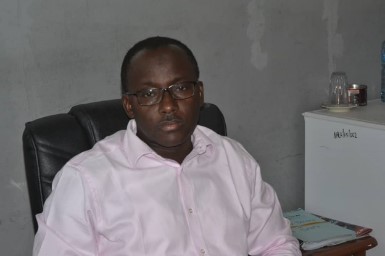By Yankuba Jallow
The battering of the COVID-19 pandemic on the lives and livelihoods of Gambians has not gone unnoticed. The negative impact of the pandemic has not spared the National Agency for Legal Aid (NALA) the Gambia’s only legal aid institution.
The Agency’s operation has been affected by the novel virus, as it could not meet up all its obligations. NALA has problem of mobility as the institution has only one good vehicle which was donated to them by the defunct constitutional review commission.
The institution has not more than seven qualified lawyers who are expected to serve the whole country.
An under-finance state institution, NALA is responsible for providing legal service for the people. The institution depends on what the Ministry of Justice gives them.
Ahmed Kemo Ceesay, the Executive Director of NALA, said his office was impacted by the coronavirus. He said NALA was created by an Act of the National Assembly to implement what has been provided for under the 1997 Constitution which gives every person charged with a criminal offence the right to a lawyer.
He explained that every person charged with a criminal offence shall be presumed innocent until proven.
“You just don’t become guilty because the police or someone else say you did it. You have to be brought before a court of competent jurisdiction. You are presumed innocent until you are proven guilty before a court of competent jurisdiction. There is a process that needs to be followed and everybody should go through that process. The evidence have to be gathered in a way and that evidence should be and can be challenged before the court before the court comes to the decision as to the guilt or otherwise,” he said.
He said many peoples do not understand how the law and procedure works, thus, the need to establish a legal aid agency.
Ceesay said laws under section 24 of the 1997 Constitution gives right to every person charged with a criminal offence to be provided with all facilities to prepare for their defence. He said NALA provides legal representation for people in court.
“If you create it and you don’t give it the tools to its work then you created it, but it cannot do anything. Therefore, Government should allocate a specific amount to NALA to enable the agency to deliver its mandate,” he said.
He said if the Government don’t do, then NALA won’t be able to function.
“So, you would be expecting it to function but it cannot. This is because it does not have the resources,” he said.
NALA now moves from Banjul to Kanifing Industrial Area. Ceesay said NALA needs vehicles and their current location is not a working distance from any of the courts.
“We need computers. We need printers. We need a comfortable place to be just like any other Ministry or department. More importantly we need vehicles to go to courts. Our present location is not a working distance from any court,” he said.
He said this means that if they have to go to court they need transport to do that.
“The Ministry of Justice have transport to go. The Judge or judges have transport to go court. You can’t expect NALA to work to court. You can’t expect NALA staff to make their own vehicle arrangements to go to court. It cannot work like that. It should work as it should. So, we need vehicles to go to court,” he said.
Ceesay said the courts in the Gambia are situated in different areas in the country up to Basse and NALA is expected to reach all of them.
“At the moment, our ability to go to the Basse courts is very difficult and very affected by the lack of vehicles and the lack of personnel,” he said.
NALA currently have not more than seven qualified lawyers. Ceesay said they have been surviving on the “leftovers” of the Ministry of Justice.
“In reality, we need about twenty lawyers to be more effective in the delivery of services,” he said. “Whatever the Ministry of Justice gives NALA that is what NALA gets in order to survive. There has never been a conscious plan/policy design to make NALA to stand on its own as an independent institution to do its work.”
Ceesay explained that NALA cannot plan anything on their own because they only survive by whatever the Ministry of Justice gives them.
“It is Government’s duty to make NALA function and it has to provide resources for NALA,” he said.
On Covid-19
Speaking further, Ceesay recalled that there were times when the courts were not sitting and the prisoners were confined at one place for the fear of contracting Covid-19.
“There were periods when the courts were not sitting and that really affected our clients,” he said.
He said NALA made mass bail applications for alleged child offenders and they were all granted bail, adding that, for adults, some of the bail applications were granted while some were refused.
“The fact that the courts have not been sitting and the fact that the virtual courts have not been as effective as they ought to be, it means more delay has been caused by Covid-19,” he said.
The Legal Aid Act provides that NALA is a cooperate body that can enter contract on its own name, can sue and be sued. Clearly, there are several provisions in the Act that make NALA an independent institution. Section 17 of the NALA Act states that the annual budget of the agency should be appropriated and approved by the National Assembly.
The Act also gives NALA the mandate to open NALA fund account where any donations or any fund received could be put. It is just in practice that NALA has never been allowed to realise that independence.
Ceesay said NALA has low capacity to take on new cases or to carry on with a complex case, but can ask outside lawyers to take it probono and pay reasonable expenses from the fund to cover their expenses.
“Clearly, it states that NALA’s fund should be appropriated but that does not happen. So NALA’s fund never get appropriated by the National Assembly as it supposed to be. It is not a case as to whether NALA should be independent, but rather NALA is not being allowed to be independent,” he said.
NALA has a governing body that formulate policies that NALA should adopt to follow its workplan, strategies and activities among others. Ceesay said all these things require funds and it is not the Ministry of Justice to decide these things.
He told Foroyaa that NALA has only one good vehicle and it was allocated to them by the defunct Constitutional Review Commission.
“Even that vehicle we have to fight – we have to struggle for it. We understand that some people did not think NALA should get that vehicle. We are still fighting because they may still decide not take the vehicle from us in which we will be left with no vehicle,” he said.



















